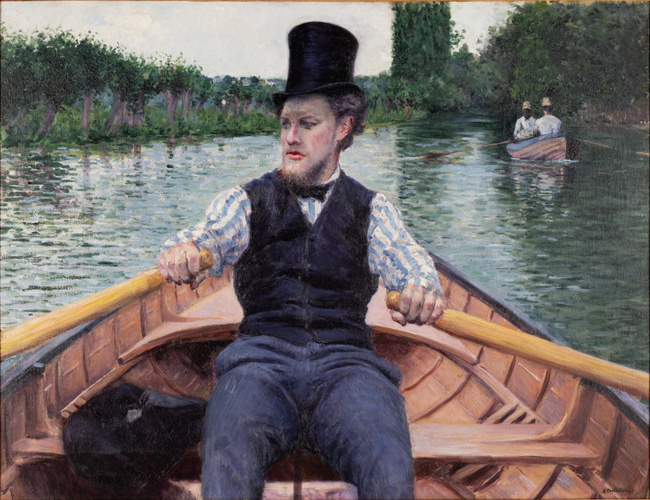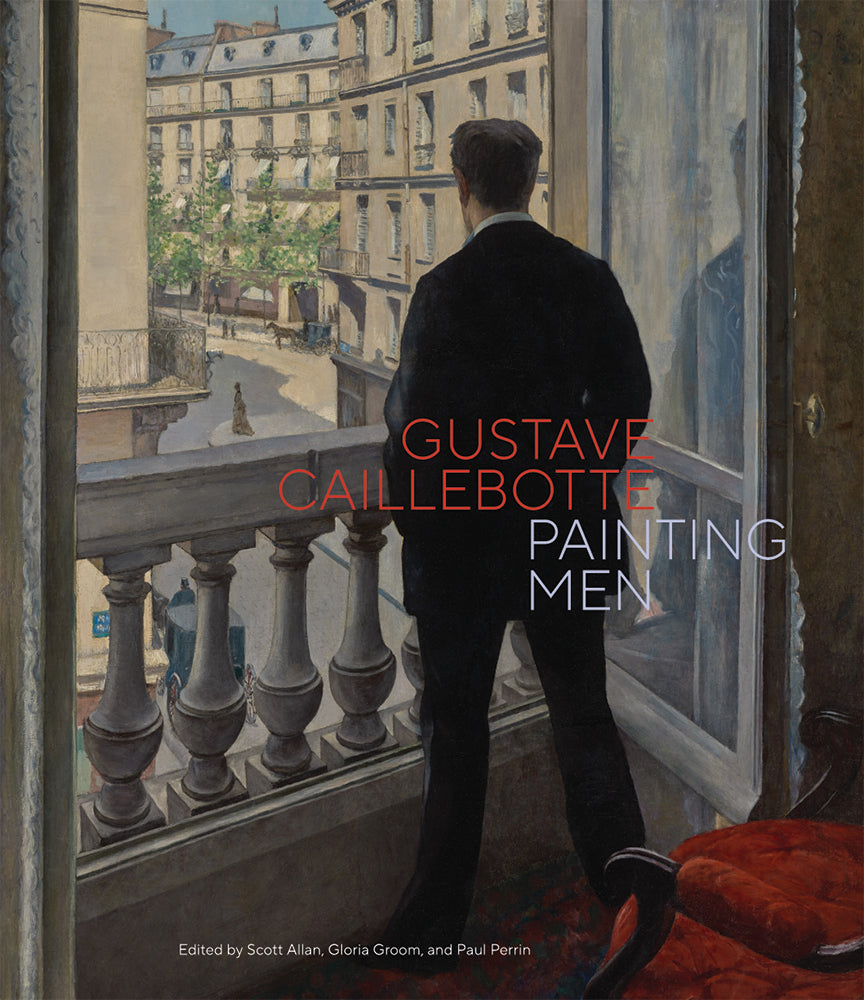The exhibition presented at the Musée d'Orsay in the fall of 2024 takes as its subject Gustave Caillebotte's (1848-1894) predilection for male figures and portraits of men, and aims to question the radical modernity of the artist's masterpieces through the prism of the new perspective that art history has on 19th-century masculinities
In his desire to produce a true and new art, Caillebotte took as his subject his immediate environment (Haussmann's Paris, the holiday resorts around the capital), the men around him (his brothers, the workers working for his family, his sailing friends, etc.) and ultimately his own existence. Responding to the "realist" program, he introduced new figures into painting such as the urban worker, the man on the balcony, the sportsman or even the naked man in the privacy of his toilet. At a time of the triumph of virility and republican fraternity, but also of the first crisis of traditional masculinity, the novelty and power of these images questioned both the social and sexual order. Beyond his own identity, that of a young and rich Parisian bachelor, Caillebotte brought to the heart of impressionism and modernity a profound questioning of the masculine condition.
This project is motivated by the recent acquisition of two major paintings by Caillebotte by the J. Paul Getty Museum ( Young Man at His Window ) and the Musée d'Orsay ( Boating Party ), and is supported by the presence of the artist's masterpiece, Paris Street, Rainy Weather , on loan from the Art Institute of Chicago. The exhibition, composed of approximately 70 works, brings together Caillebotte's most important figure paintings as well as pastels, drawings, photographs and documents.
This event is organized in the year of the 130th anniversary of the artist's death (1894), which also corresponds to the date of the bequest of his incredible collection of impressionist paintings to the State. To celebrate this event, all the works of the bequest will be presented temporarily in one of the rooms of the museum's permanent exhibition, reviving the opening of the "Caillebotte room" at the Musée du Luxembourg in 1897. This event is part of the continuity of the numerous exhibitions which, since the major retrospective of 1994-1995 (Paris, Chicago), have allowed us to rediscover the figure of Gustave Caillebotte (1848-1894) and to highlight certain facets of his work: the Yerres period, the links between his painting and photography, his passion for the art of gardens, etc.
Exhibition artworks
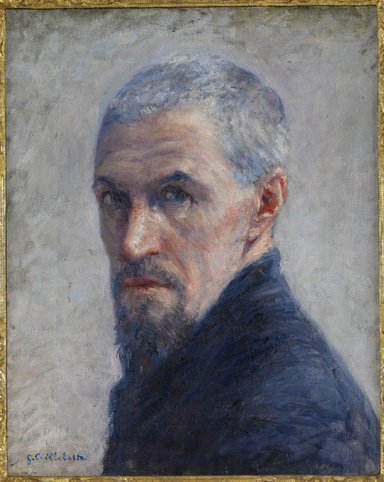
Portrait de l'artiste, vers 1892
Musée d'Orsay
Achat avec les fonds d'une donation anonyme canadienne, 1971
© GrandPalaisRmn (musée d'Orsay) / Martine Beck-Coppola
See the notice of the artwork
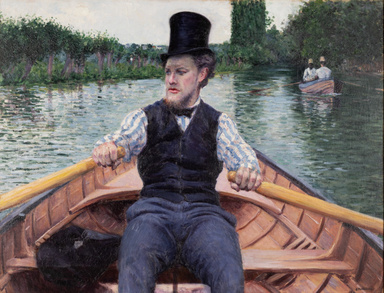
Partie de bateau, vers 1877-1878
Musée d'Orsay
Achat grâce au mécénat exclusif de LVMH, Grand Mécène de l’établissement, 2022
© Musée d’Orsay, dist. RMN-Grand Palais / Sophie Crépy
See the notice of the artwork
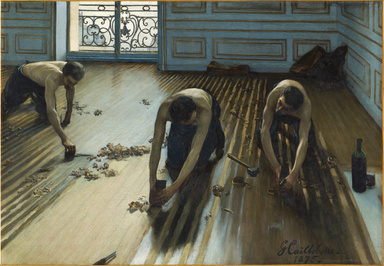
Les raboteurs de parquet, 1875
Musée d'Orsay
Don, 1894
© Musée d’Orsay, Dist. RMN-Grand Palais / Patrice Schmidt
See the notice of the artwork
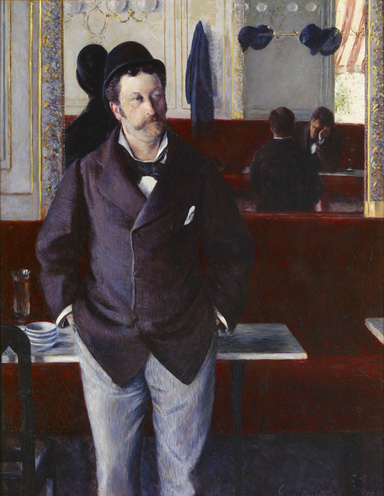
Au café, 1880
Collection Musée d'Orsay - Musée des Beaux-Arts, Rouen
Achat, 1943
© Musée d’Orsay, dist. RMN-Grand Palais
See the notice of the artwork
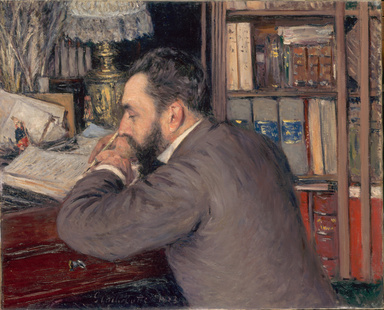
Henri Cordier, 1883
Musée d'Orsay
Don Mme Henri Cordier, 1926
© Musée d’Orsay, Dist. RMN-Grand Palais / Patrice Schmidt
See the notice of the artwork
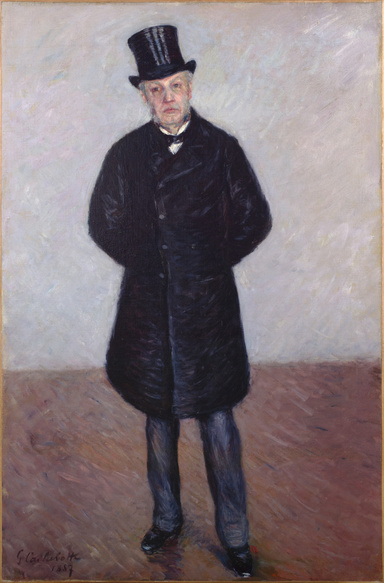
Portrait de Jean Daurelle, en pied, 1887
Musée d'Orsay
Legs Marie-Jeanne Daurelle, 2019
© Musée d’Orsay, Dist. RMN-Grand Palais / Patrice Schmidt
See the notice of the artwork
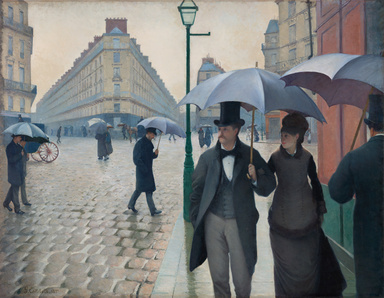
Rue de Paris, temps de pluie, 1877
Chicago, The Art Institute of Chicago
Charles H. and Mary F. S. Worcester Collection, 1964.336
© Image Courtesy of The Art Institute of Chicago
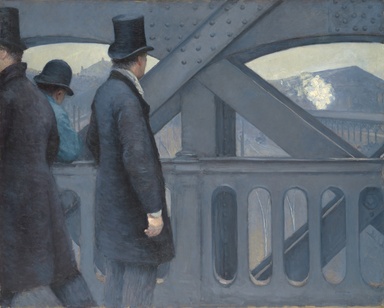
Le pont de l’Europe, 1876-1877
© Etats-Unis, Texas, fort Worth, Kimbell Art Museum / Kimbell Art Museum
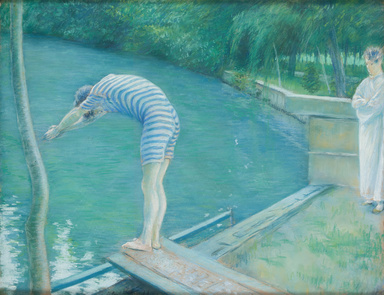
Le Nageur, 1877
Musée d'Orsay
Achat, 1946
© Musée d’Orsay, Dist. RMN-Grand Palais / Patrice Schmidt
See the notice of the artwork
Edited by Scott Allan, Gloria Groom, and Paul Perrin
This richly illustrated volume paints a complex portrait of Caillebotte, masculinity, and identity in late nineteenth-century France.
More than any other French Impressionist, painter Gustave Caillebotte (1848–1894) observed and depicted the many men in his life, including his brothers and friends, employees, and the workers and bourgeois in his Parisian neighborhood. Male subjects feature prominently in some of his best-known works, such as The Floor Scrapers, Man at His Bath, Young Man at His Window, Boating Party, and Paris Street, Rainy Day. The originality of his paintings of men is fully explored for the first time in this catalogue, published to accompany a major international exhibition co-organized by the J. Paul Getty Museum, Musée d’Orsay, and the Art Institute of Chicago.
Alongside paintings, drawings, and photographs, as well as an appendix featuring maps and new biographical research that sheds light on Caillebotte’s social network, this volume includes historically grounded thematic essays by curators and leading scholars. By exploring the complex and varied facets of Caillebotte’s identity—as son, brother, soldier, bachelor, amateur, sportsman, and so on—these essays pose questions of identity, leaving space for ambiguous and fluid expressions of gender and masculinity—for both Caillebotte and the larger late nineteenth-century French world.
This volume is published to accompany an exhibition on view at the Musée d’Orsay from October 8, 2024, to January 19, 2025, J. Paul Getty Museum at the Getty Center from March 25 to May 25, 2025, and The Art Institute of Chicago from June 29 to October 5, 2025.
Scott Allan is curator in the Department of Paintings at the J. Paul Getty Museum. Gloria Groom is chair of European painting and sculpture and David and Mary Winton Green Curator at the Art Institute of Chicago. Paul Perrin is chief curator, head of curatorial and director of collections at the Musée d'Orsay.
“Gustave Caillebotte remains the most mysterious core member of the Impressionist movement. This catalogue includes the latest scholarship on the artist by contemporary experts in the field—museum and academic art historians based in France and the United States—bringing fresh readings to Caillebotte’s known work as well as investigations of several paintings only recently arrived in the public sphere. It is spectacularly illustrated with the best of the artist’s oeuvre, definitively establishing the striking singularity of Caillebotte’s artistic achievement.”
—Mary Morton, Curator of French Paintings, National Gallery of Art
“The essays inside this beautifully illustrated catalogue offer groundbreaking insights into a dominant, if largely ignored, theme in Caillebotte’s work. A major contribution to the existing scholarship on the artist, this book will be a standard reference for years to come.”
—Marnin Young, author of Realism in the Age of Impressionism: Painting and the Politics of Time
“Accompanying a major international loan exhibition, Gustave Caillebotte: Painting Men offers a fascinating array of essays that explore complex questions of masculinity and virility in the art of this still enigmatic painter. The book features the wisdom of many seasoned scholars of Impressionism, but it is also noteworthy for the contributions of a new generation of authors, whose fresh eyes and new voices help bring the artist’s world vividly to life.”
—George T. M. Shackelford, Deputy Director, Kimbell Art Museum
264 pages
9 1/2 x 11 inches
195 color illustrations
ISBN 978-1-60606-944-8
hardcover
Getty Publications
Imprint: J. Paul Getty Museum + The Art Institute of Chicago
